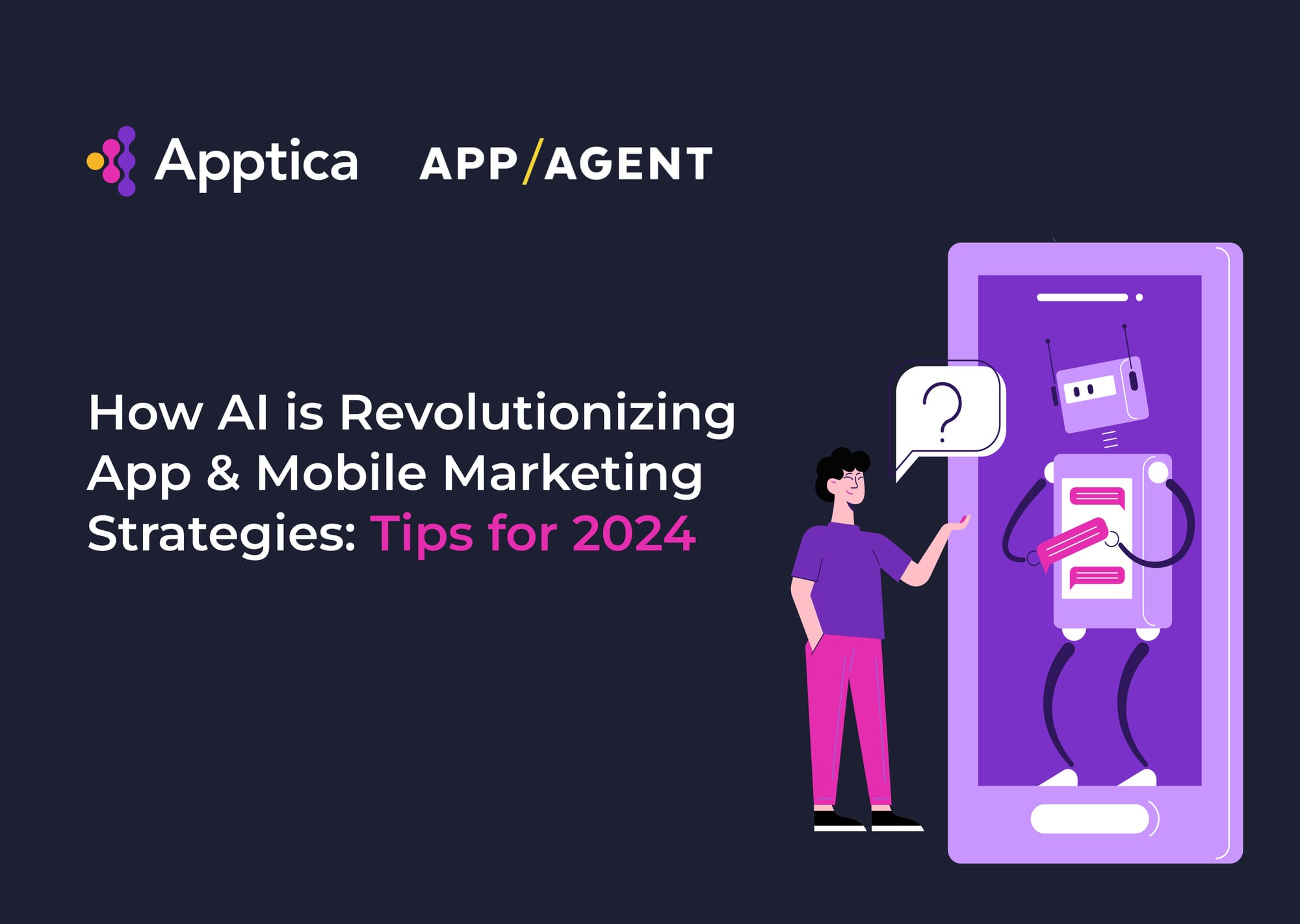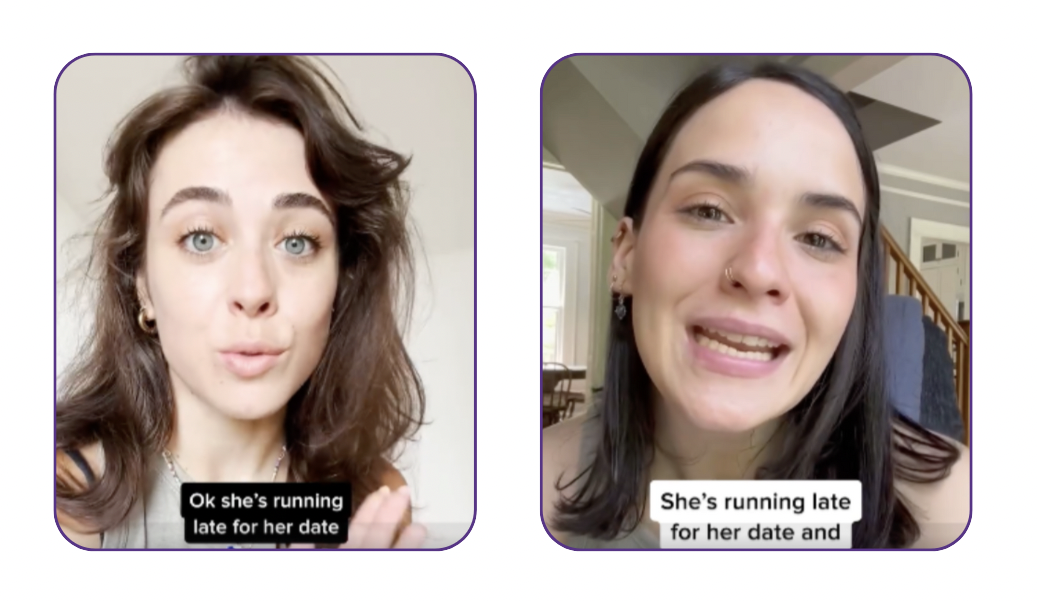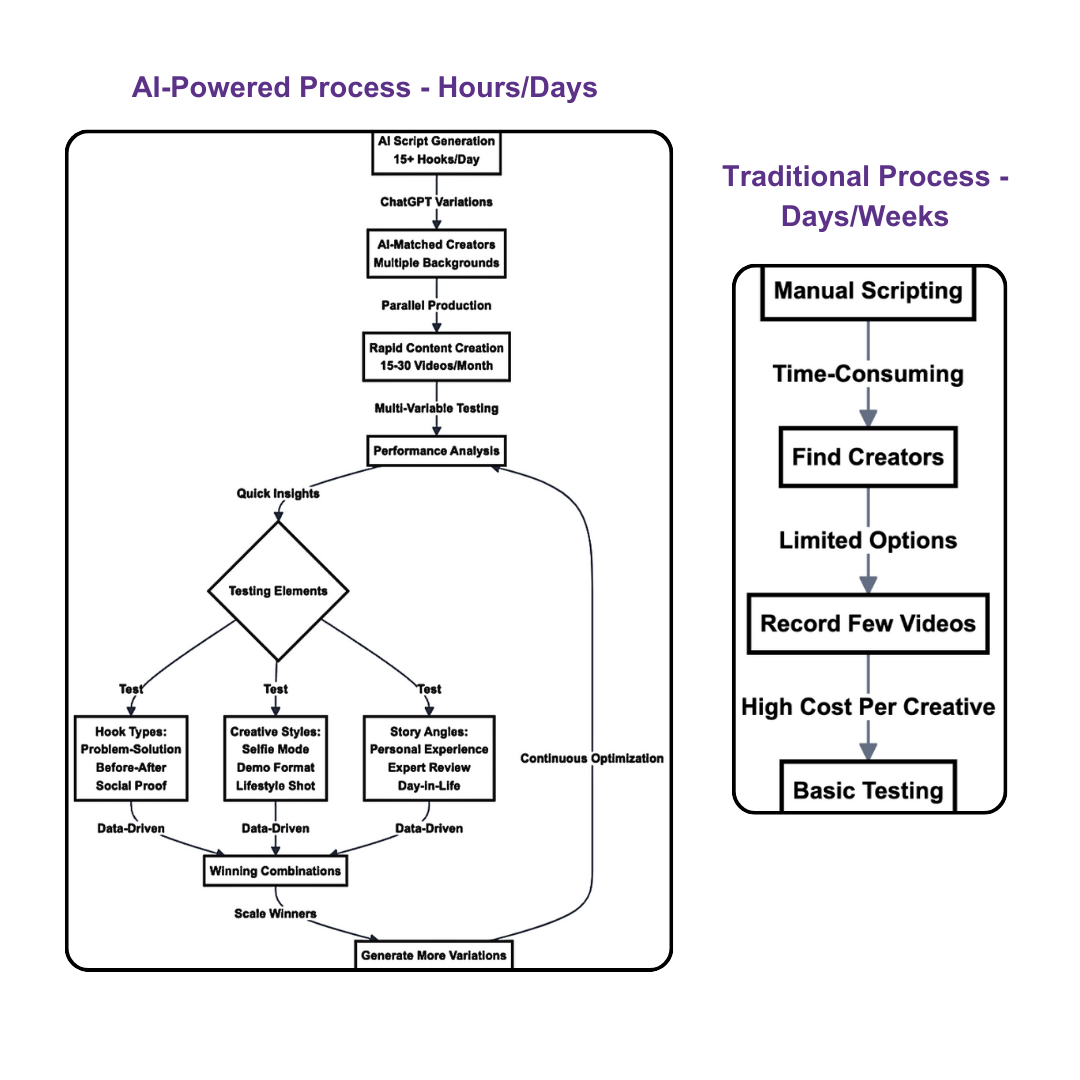How AI is Revolutionizing App & Mobile Marketing Strategies: Tips for 2024
AI is transforming mobile marketing with tools for personalization, auto-support, and fraud detection. Not a magic fix, but a powerful asset for efficiency and conversions. Human insight remains crucial to unlock AI's full potential. Learn how to enhance your strategy with smart AI applications.

Let’s skip the obligatory ‘AI changed the world’ intro: this already happened. Instead, let’s separate the hype from reality, especially in mobile marketing. While AI tools have transformed our industry, they're not magical solutions – they're sophisticated instruments that require skilled hands to wield them effectively.
We've all seen the headlines: ChatGPT's occasional creative interpretation of facts, Google's AI serving up questionable life advice, and Midjourney generating artwork that sometimes ventures into the realm of the surreal. These limitations, however, don't diminish AI's true value proposition: its remarkable ability to streamline and enhance mobile marketing operations.
In this article, we'll talk about the actual powers of AI, applicable to your app’s daily life. The opportunities lie not just in automating routine tasks, but in opening up entirely new possibilities. Let’s explore these and show you how to use them effectively in your marketing strategy.
Personalize Messages to Your Users
Nobody likes feeling like just another number in a spreadsheet. Give your users a personalized experience, and they'll reward you for it: in fact, 80% of them are more likely to buy from brands that make the effort to customize their approach.
Personalization isn't just about making customers feel warm and fuzzy, though: it's a serious business booster. We're talking about cutting user acquisition costs in half, bumping up revenue by 5-15%, and making your marketing budget 10-30% more effective.
This is where AI comes in. It can dive deep into user behavior to craft messages that actually mean something to each person receiving them. Through push notifications, text or email, AI can help you say the right thing at the right time. It's particularly clever at things like spotting someone who's abandoned their shopping cart and automatically reaching out with a tempting discount code.
Be careful: AI won’t replace your data science or product teams just yet. Think of it more like a super-smart intern who needs supervision. While it can generate content at lightning speed, you'll still need human eyes to review everything it creates to avoid potential viral scandals.
AI in Automated Customer Service
Ever notice how some customer questions fall into that awkward middle ground? They're too specific for your FAQ page, but not quite complicated enough to pull your support team away from bigger fires. Let aside the monetary costs of human support: no human can juggle dozens of customer chats simultaneously without losing their mind.
After years of bad press, AI chatbots seem to be finally able to handle most of your customers’ questions while keeping the answers relevant and personalized. After all, what is the history of customer requests if not a large language database ready to be used in learning? Train a forked LLM on this database, and most customer issues will be resolved in no time.
And here's where it gets really interesting: these bots can double as subtle sales assistants, especially in e-commerce or gaming apps. Say a player just bought a magical sword in your game — the bot remembers that, along with their playing style. Next thing you know, it's suggesting a matching shield or some power-ups that complement their gameplay. It's like having a personal shopping assistant who actually remembers what your customers like, helping you boost those in-app purchases without being pushy about it.
Content Creation
AI isn't quite ready to be your solo content creator: it still gets facts mixed up sometimes, and there's nothing worse than publishing something that makes your brand look uninformed. Even long-form articles can be full of cliches, old data and broken links: that’s why humans write articles for Apptica:)
Think of AI as your brainstorming buddy rather than your replacement, because that's where it shines: pumping out variations of text at lightning speed. With any chat bot, you can quickly generate headlines and CTAs for multiple campaigns, either by adjusting the same message to different platforms or by translating it to different languages and cultures: it’s all in the prompt.
AI is also changing the way we create visuals. Tools like Midjourney, Stable Diffusion, and Dall-E help make creatives more accessible. On top of this, videos and audio voiceovers are now within reach for everyone. Once costly and time-consuming, these assets can now be generated affordably, making the entire creative process more cost-effective and accessible for brands of all sizes. Moreover, sentiment analysis uses AI to gauge consumer sentiment from social media and app reviews, providing insights that enable quick adjustments to positioning, making campaigns and creatives more user-centric.
Here's a cool trick: use one AI to write your image prompts, then feed those into another AI for image generation. It's like letting two AIs collaborate on your creative work: sometimes they get each other better than we get them!
AI also enables multi-channel ad personalization by crafting unique content and CTAs tailored to platforms like Facebook and TikTok, aligning them with each platform's style and expectations.
And finally, AI has transformed UGC creative development. With tools like ChatGPT and AI-driven UGC partners, we now test 15-30 UGC creatives monthly - complete with variations in hooks, copy, actors, and formats. This volume and variety, once out of reach, allow for quick iteration and discovery of winning creative elements, resulting in more efficient and impactful content production.
AI seamlessly replicates human-like scripts, actors, voiceovers, and captions – making it nearly impossible to discern which of the examples below is AI-generated. (Hint: the second one is!)

As mentioned earlier, the processes of ad creatives testing with application of artificial intelligence tools and without it are very different...

A/B Testing
A/B testing is one of the key responsibilities of growth managers, and one of their worth pains in the back: how do you cook up 12 pairs of messages for the same app? Now, AI is basically your marketing sous chef on steroids.
Want to test different approaches? AI can whip up dozens of variations in minutes. Maybe you want to play with different angles for your Black Friday sale - one version emphasizing "70% OFF EVERYTHING!" while another goes with "Last chance: Only 24 hours left!" Before AI, your team would spend days crafting these variations. Now? It's practically instant.
But the real magic happens when you're analyzing results. AI doesn't just help create the tests - it tears through the data like a hot knife through butter. It'll tell you not just which version won, but by how much, and whether the results are statistically significant enough to bet your marketing budget on.
You don’t have to stop there: layer in some machine learning, and you start uncovering some previously ignored insights. Maybe your price-sensitive customers are most likely to bite on Sunday evenings, while your luxury segment tends to convert better during business hours. Or perhaps certain push notifications work better at particular times of day. These aren't just random correlations: they're actionable insights that you can use to create hyper-effective campaigns.
Oversee Communication Networks
You can also think of AI as your communications traffic controller: only instead of managing planes, it's juggling your messages across different channels. It's constantly watching how your messages are performing, checking which carriers are playing nice, and making split-second decisions about the best route for each message.
Got an important push notification that's not getting through? AI can instantly switch it to SMS, and adapt the message so you pay lower fees. Email deliverability dropping? It'll find a better path. This isn't just about finding the cheapest way to reach your users: it's about making sure your messages actually land in their hands, around the clock.
You will understand the importance of this when you're promoting your app. Your customers are probably getting bombarded with notifications from a dozen other apps that want their attention. Miss a few key touchpoints, and they might drift away to your competitors; keep spamming them every day, and they’ll leave you even sooner. Timing is of the essence.
Changes in SEO
SEO is going through constant changes, but this one seems cosmic in nature: what if more and more people will use AI chatbots to search for things, and all your meta-optimized, keyword-infused pages won’t even matter anymore?
Google's very own new AI search is the elephant in the room. Picture this: you search for something, and instead of getting a list of links, you get an AI-generated answer right there at the top. Pretty convenient for users, right? But for websites that have been living off those sweet "how to" and "what is" clicks, it's a bit like watching your favorite fishing spot get dried up.
Before you start panicking about your traffic numbers, here's the kick: Google is actually sending more clicks to websites than ever before. It's just that the clicks are automated, not human; yet your information is still being seen by thousands if not millions of people. So while AI might snatch some of your basic informational traffic, it's also making search more accessible and user-friendly. People are searching more, asking better questions, and diving deeper into topics.
The real action is happening in the long-tail keywords: those super-specific searches that might not get tons of volume but often lead to actual conversions. Sure, someone might get a quick answer from AI about "what is mobile marketing," but when they're ready to dive into "best app intelligence tool with market and store insights," they will arrive at the destination:)
So yes, the SEO you’re used to is gone: but the new one is already here. The key is adapting your content to complement, rather than compete with, AI-generated answers.
Changes in Mobile Advertising
The way we search is not the only thing changing: it's transforming the entire mobile advertising playbook. Google's now weaving paid ads right into those AI-generated answers you get when you search. This makes sense: while a chatbot is explaining something to you, it can smoothly suggest relevant products or services that actually make sense in the context.
Even more importantly, AI is super powerful at analyzing such conversations and at spotting who's most likely to download your app or make some in-app purchases, based on how they've behaved in the past and what they're doing right now. Even better, it can tap you on the shoulder and say, "Hey, this user looks like they're about to ghost you", giving you a chance to win them back before they drift away.
There’s another important AI application we forgot to mention: ad bids. Remember the days of manually adjusting your bid strategy? That's becoming as outdated as flip phones. AI is now handling this in real-time, looking at each potential customer and deciding exactly how much their click is worth. Sure, automated bidding existed for a long time: but you still needed to give it some rules, and most were limited to simple “if A < B”. The actual intelligence is way more profound, and some ad networks are already playing with this tech, and it's like having a trading algorithm for your ad spend – constantly working to get you the best deal possible.
The bottom line? AI is making mobile advertising smarter, more targeted, and honestly, more interesting. It's not just about blasting ads anymore – it's about getting the right message to the right person at exactly the right moment.
Similarly, Meta is enhancing advertising capabilities through its Advantage+ suite. This includes creative text generation powered by AI, which generates optimized copy tailored to different audiences. Not only can AI generate new copy, but it can also adapt the tone - from friendly to professional, from conversational to knowledgeable - all with just a few clicks.
Advertisers can also benefit from AI-based performance recommendations, helping them identify the best strategies for maximizing engagement. Advantage+ creative enhancements offer features like image animation, 3D enhancements, visual touch-ups, overlays, and music integration, making ads more engaging. Furthermore, it can automatically translate ads, allowing advertisers to reach audiences in multiple languages.
Additionally, Advantage+ creative image generation can change backgrounds or create similar images inspired by the original creative.
Examples from AppAgent
Examples from AppAgent
Fraud Detection
Unsurprisingly, this was one of the first applications of AI-powered systems. They are great at spotting unusual patterns in clicks or sales data that might signal fraud by keeping a constant eye on traffic and user activity.
And if bot activity is old and learned, of the newest threats is deepfakes and fake leads. There is no limit to what some will do to bastardize competitors’ systems,including creating fake clients who drain your resources — think DDoS attack, but way more advanced. Fortunately, tools like Hivemoderation and Sensity help detect deepfake videos and AI-generated text. While they’re not foolproof, they’re definitely better than flying blind — and can save you from costly mistakes.
Before We Go
Artificial intelligence is changing the game in mobile and app marketing by bringing in tools for personalizing content, predicting trends, targeting users, spotting fraud, and managing chatbots. AI makes tasks faster and dives deep into user behavior to boost marketing efficiency and drive conversions. But you still need a human touch to keep things accurate and balanced.
Google’s latest AI update shakes up SEO and mobile ads by adding AI-generated answers in search results and weaving in paid ads to make the user experience smoother and ads more relevant. The way we search and discover apps is also changing, with powerful chatbots having the chance to become the ‘everything’ app, so the fire is on.
However, with its ability to craft high-conversion ads and detect fraud, AI is still a force for good: when used properly, it helps get the most out of ad budgets and pushes ROI higher. Ultimately, AI makes mobile marketing more effective when it’s paired with smart planning and a watchful human eye. And here at Apptica, we're ready to power your human intelligence with some automagical insights.
If you have any questions about AI tools or any other topic in app marketing, feel free to write to us at marketing@apptica.com — we've got your back!






